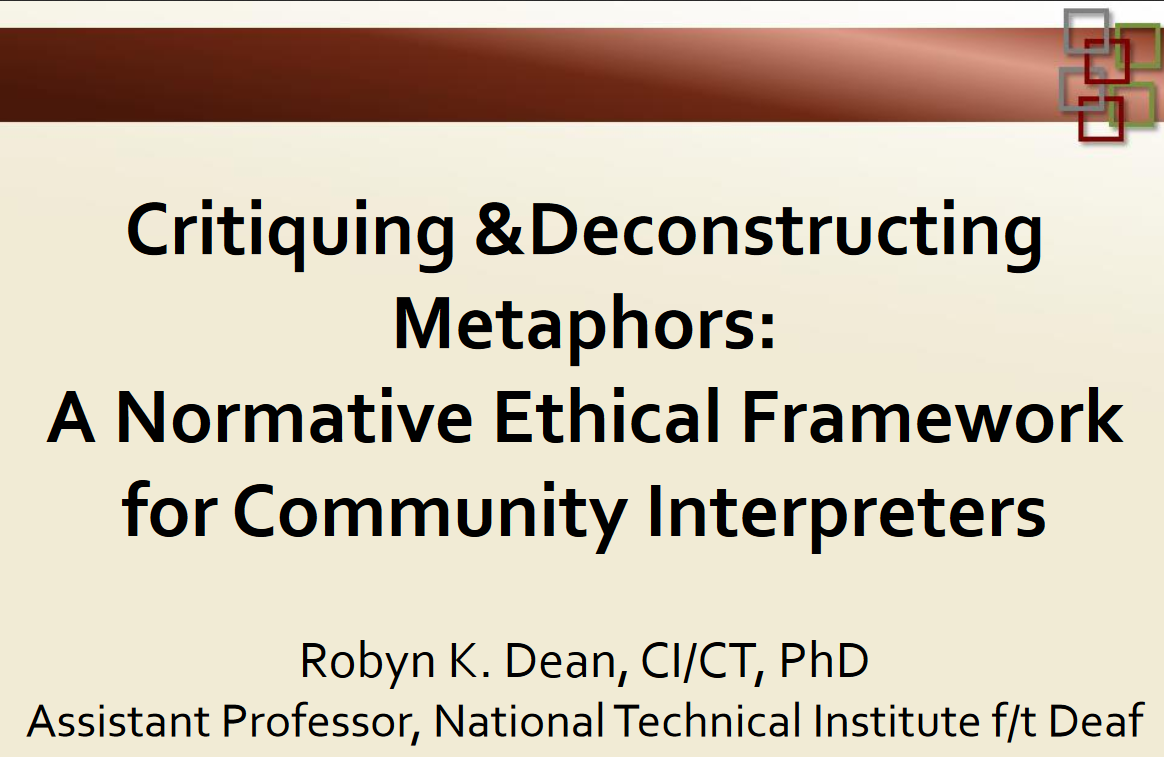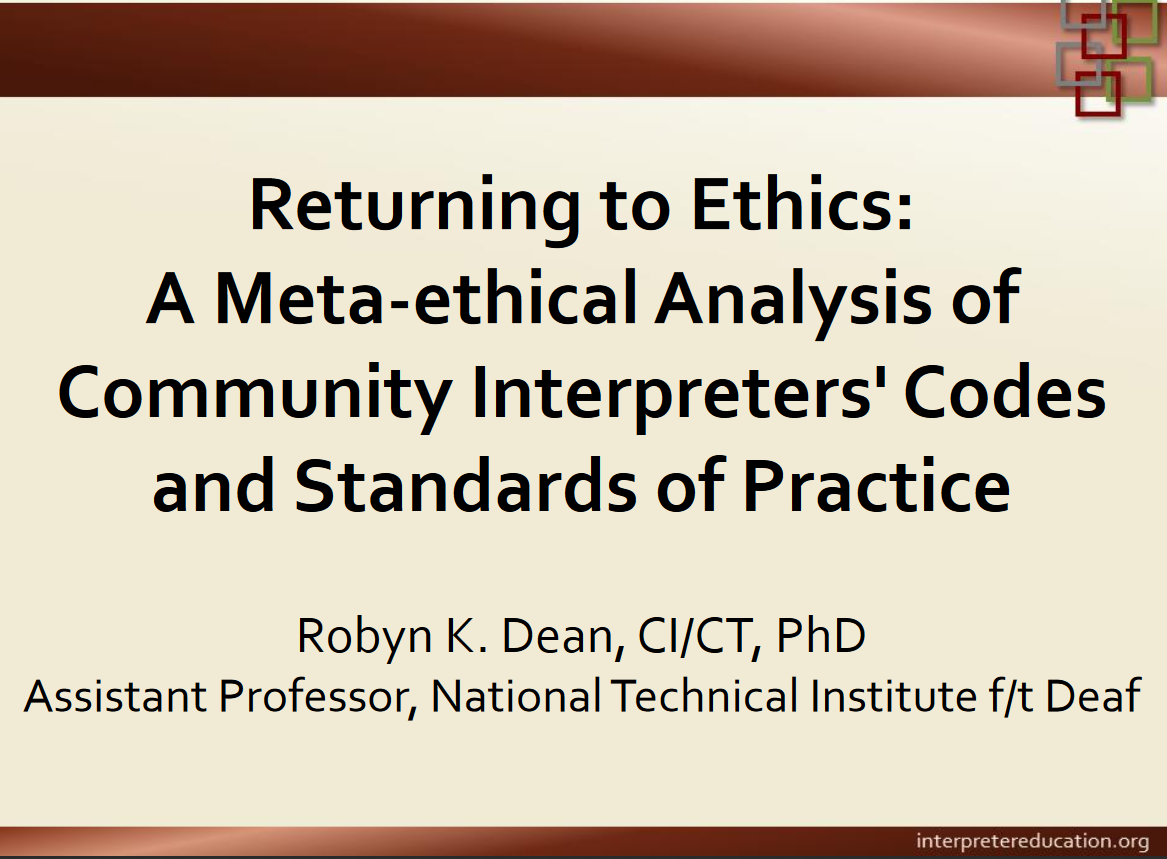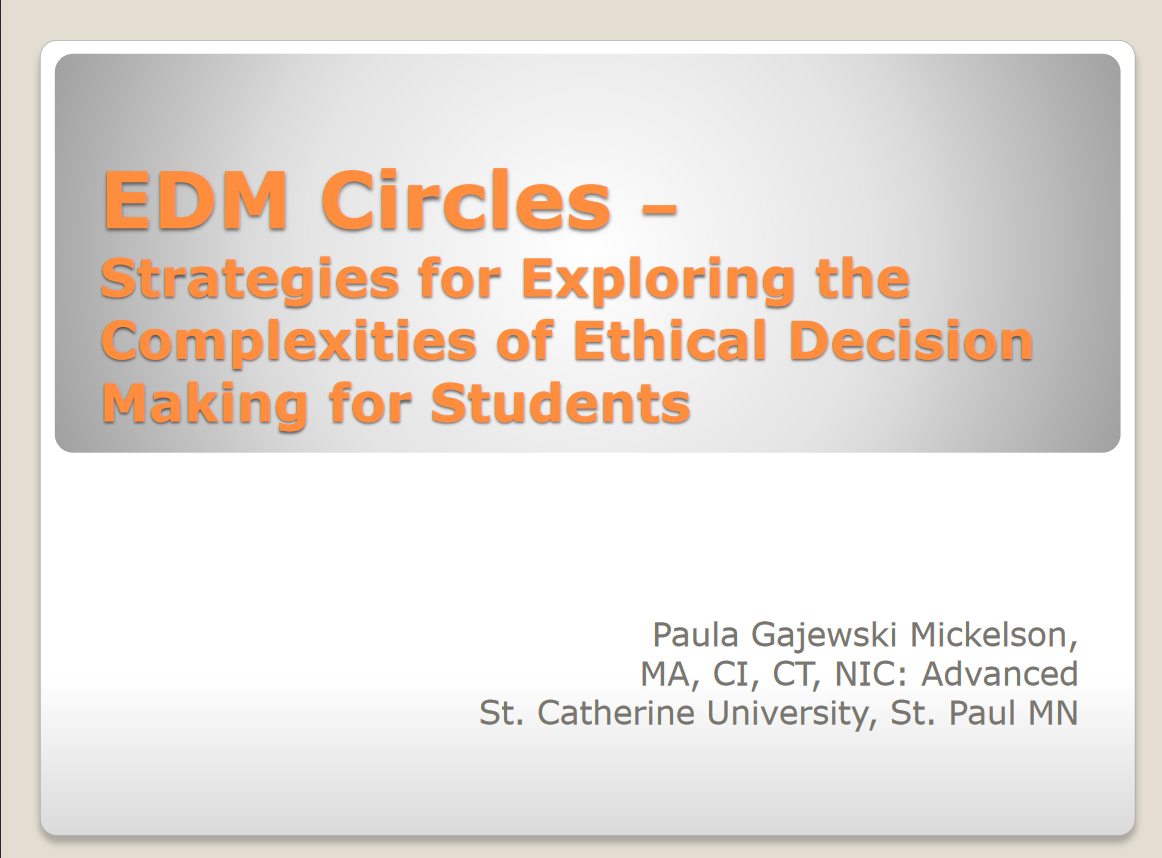Webinars:
Ethics Series
This collection of webinar focuses on the topic area of ethics.
The following is provided for each webinar:
-
- Title,
- Air date,
- Presenter,
- Description,
- Target audience, and
- Aavailable materials are provided.
Within this series, webinars are listed in chronological order from the most recent webinar to the oldest.
Want CEUs?
- Find a CMP Approved Sponsor for an Independent Study through the Registry of Interpreters for the Deaf
- Work with the Sponsor to design an Independent Study plan involving any of the webinars below
Ethics Webinars
Critiquing & Deconstructing Metaphors: A Normative Ethical Framework for Community Interpreters
Original Air Date: September 12, 2016
Presenter: Robyn Dean, CI/CT, PhD
Description: In 2000, Pym proposed that translators and interpreters adopt an approach of cooperation. In other words, practitioners should seek to enhance (or at least not prevent) the cooperation between interlocutors of other languages/cultures.
Moreover, this proposition is in alignment with ideals from morality scholarship: Cooperation is the highest form of ethical reasoning. In community interpreting, this ideal is arguably evident in the frequently used metaphor of member of the team. This paper distills the “interpreter-as-team member” metaphor into a series of professional values to propose a framework that aligns with a cooperation-based, ethical framework for interpreters working in community settings.
Target Audience: Working interpreters & other interested stakeholders
Materials:
Returning to Ethics: A Meta-ethical Analysis of Community Interpreters' Codes and Standards of Practice
Original Air Date: August 29, 2016
Presenter: Robyn Dean, CI/CT, PhD
Description: In 2001, Pym made an appeal for the field to return to ethics. In response, this paper problematizes the ethical framework offered to community interpreters.
Metaphors (e.g., conduit/advocate) are often employed to describe practitioners’ behaviors and have since emerged in pedagogy and training materials as an ethical device (e.g. interpreters should or should not be a conduit). However, devices used to describe behaviors are not the same as those used to propose or evaluate behaviors. Normative ethics dictates the use of terms that evaluate the consequences of practice decisions in light of a profession’s values. As such, an alternative framework is proposed.
Target Audience: Working interpreters & other interested stakeholders
Materials:
ASL Prioritization
English Prioritization
EDM Circles - Strategies for Exploring the Complexities of Ethical Decision Making for Students
Original Air Date: February 23, 2012
Presenter: Paula Gajewski Mickelson
Description: Circle Processes are an important part of many cultures and indigenous populations around the world and are used as a means for collective decision making, community sharing and dispute resolution.
Elements of Circle Processes are also used in parts of our society as a way to build community, resolve conflict, and reach consensus. The Circle is a non-hierarchical, shared space, developed by its participants and is used as a means to share information and learn of others’ perspectives and beliefs in safe, non-threatening manner.
The purpose of this webinar is to provide a forum to learn about Circles and how to facilitate Circle Processes as a way to discuss and analyze various components of ethics and decision making. Insights from a variety of perspectives including research on conflict in interpreting, conflict theory, communications and professional guides such as the NAD-RID Code of Professional Conduct will all be a part of this discussion. Participants will be introduced to concepts of Circle Processes including the format of Circles, the role and function of Circle Keepers, and strategies to utilize this process with students and colleagues to unpack and discuss case studies explore ethical decision making.
Target Audience: IEP students, IEP faculty, internship hosts/supervisors, mentors & working interpreters
Materials:
Grant Recognition
The contents of the Project CLIMB website was developed under a grant (#H160D160001) from the Department of Education. The contents do not necessarily represent the policy of the Department of Education. Do not assume endorsement by the Federal government.
As of December 31, 2021, this grant project is no longer active or soliciting applications.
This website will remain available as a resource.

The National Clearinghouse of Rehabilitation Training Materials (NCRTM) website is a central portal for accessing archived and new rehabilitation training resources offering search capabilities, a quality rating system, as well as enhanced usability and accessibility.




